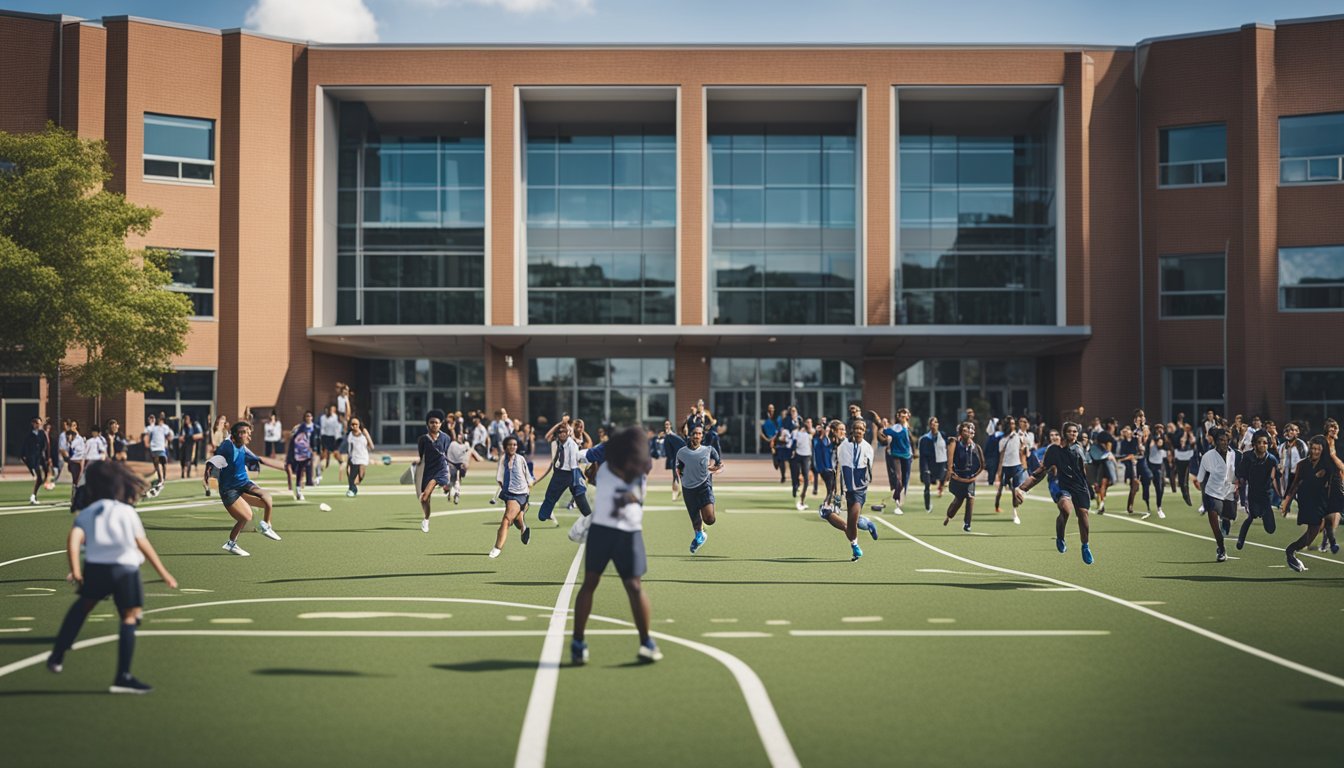Late updated: 17 Oct 2024 08:10
Written by:
Benefits of Extracurricular Activities for Students: Enhancing Academic and Social Growth
Extracurricular activities offer a wealth of benefits for students, enhancing both their educational experience and personal growth. These activities develop essential skills such as teamwork, communication, and networking, which are invaluable in their academic journey and beyond. From sports and arts to clubs and societies, participating in these activities encourages students to explore diverse interests and passions.

Such involvement not only promotes better physical health through activities like sports and dance but also supports mental well-being by reducing stress and fostering a sense of community. Students often form lasting relationships with peers, teachers, and community members, creating valuable networks that can benefit them in future educational and career opportunities.
Extracurricular activities also provide students with a structured yet enjoyable way to alleviate the pressure of academic life. By participating, students can discover their unique strengths while improving their sense of belonging, making their school years more fulfilling and balanced.
Key Takeaways
- Extracurriculars develop teamwork and communication skills
- Participation enhances physical and mental well-being
- Involvement opens up future opportunities and networks
Core Advantages of Extracurricular Activities
Engaging in extracurricular activities offers numerous benefits for students. They boost academic performance, enhance social and emotional development, and cultivate leadership and teamwork skills. These activities provide students with opportunities beyond the classroom that contribute to their holistic growth.
Fostering Academic Performance
Extracurricular activities can positively impact students' academic success. Participation in after-school activities, such as academic clubs or student government, helps students develop better time management and organisational skills. These skills are essential for balancing homework and deadlines, leading to improved GPA and overall academic performance.
Moreover, varied interests encourage students to engage in self-directed learning. This intellectual curiosity often translates into a more enthusiastic approach to their studies. Involvement in diverse activities can also offer practical examples that relate to academic concepts, making learning more tangible and exciting.
School clubs and other structured activities frequently provide students with access to mentors, such as teachers and community leaders. This mentorship contributes to academic guidance and encouragement, further promoting academic achievement and persistence.
Enhancing Social and Emotional Development
Extracurricular activities are a gateway to developing essential social and emotional skills. By participating in clubs, sports, or arts, students build interpersonal skills and foster a sense of belonging. They learn valuable social skills like communication and problem-solving, which are crucial for forming strong social connections.
These activities also provide a supportive environment where students can express themselves and gain self-confidence. Engaging with peers in a shared interest helps build a sense of community and develop emotional intelligence. Emotional well-being is nurtured as students experience success, face challenges, and overcome obstacles within a supportive framework.
Participation facilitates making new friends from various backgrounds and fostering diverse relationships. This broadens perspectives and enhances students’ emotional and social understanding, preparing them for the complexities of the world outside school.
Cultivating Leadership and Teamwork
Participation in extracurricular activities offers numerous opportunities for students to develop leadership and teamwork skills. Whether through leading a club, coordinating events, or participating as team members, students engage in leadership roles that demand responsibility and initiative.
Extracurricular activities often require collaboration, encouraging students to work effectively with others towards common goals. This enhances their communication skills and teaches them the value of cooperation and flexibility. As students take on leadership opportunities, they learn decision-making and delegation, which are crucial leadership skills.
These experiences foster a sense of accountability and achievement. Through leading and collaborating, students gain a deeper understanding of responsibility and the impact of their actions on their community. This growth in leadership and teamwork abilities is invaluable, benefiting students in their future academic and professional endeavours.
Impact on Future Opportunities

Extracurricular activities can significantly influence future opportunities by enhancing college admissions prospects, providing valuable skills and experiences, and promoting overall well-being. These activities play a vital role in shaping a student's academic and personal development.
Building a Competitive Edge for College Admissions
Participation in extracurricular activities is a pivotal factor in college admissions. Institutions seek well-rounded candidates with varied interests and experiences.
When we engage in school-sponsored activities, sports teams, or performing arts, we demonstrate discipline, motivation, and time management skills. This involvement not only showcases our ability to balance academics and extracurricular commitments but also highlights our leadership potential and teamwork abilities. University admission boards often look for applicants who contribute positively to their school community, making these activities a valuable addition to any college application.
Gaining Practical Experience and Skills
Extracurricular activities offer us the chance to gain practical experience and crucial skills that are often not covered in the classroom. Through community service, internships, or volunteer work, we learn decision-making, self-regulation, and executive function.
Exploring various interests allows us to test potential career paths and develop relevant job skills. These experiences can be critical in building a strong resume for future job opportunities. Engaging in after-school programs or hobbies also fosters creative thinking and problem-solving abilities, which are highly valued in the workforce.
Contributions to Health and Wellbeing
Participation in extracurricular activities significantly benefits our physical and mental health. Engaging in sports teams or physical activities is essential in maintaining a healthy body weight and improving physical health. These activities can enhance self-esteem and resilience, creating a positive impact on our mental health.
Being active in extracurriculars reduces feelings of loneliness and helps combat stress, providing an essential balance to academic pressures. By participating in activities that promote social interaction, we can improve our social skills, leading to better relationships and a sense of belonging. These improvements in health and wellbeing are crucial as they contribute to our overall success and opportunities in the future.
Frequently Asked Questions

Extracurricular activities offer significant benefits that influence various aspects of a student's life. They not only provide academic advantages but also contribute to personal and social growth, which can enhance one's prospects when applying to universities.
What advantages do students gain from participating in extracurricular activities?
Extracurricular activities help students explore interests, enabling a deeper engagement with their passions. These activities encourage healthier lifestyle choices, foster emotional well-being, and aid in developing essential life skills such as time management and leadership.
In what ways do extracurricular activities contribute to a student's academic performance?
Participation in these activities can lead to improved classroom performance. Skills acquired outside the classroom, such as critical thinking and creativity, often translate into better academic achievements. Engaging in structured extracurriculars has been linked to increased motivation and focus in academic settings.
Can involvement in extracurricular activities enhance a young person's social skills?
Through group activities like clubs and sports, students build teamwork and communication skills. Such opportunities to interact with peers in diverse settings are invaluable in developing social adeptness and forming lasting friendships. This interaction boosts self-confidence and helps students learn to work effectively in diverse teams.
What role do extracurricular activities play in the personal development of students?
Extracurriculars serve as platforms for personal growth, offering experiences that shape resilience and self-discipline. They allow students to cultivate interests that reflect their identities and provide opportunities for self-expression and goal-setting, which are essential for personal development.
How do extracurricular activities influence college admission prospects for students?
Colleges often look for applicants who demonstrate well-rounded profiles, and involvement in extracurricular activities showcases leadership, passion, and commitment. Such experiences can differentiate a student's application, highlighting the ability to balance academics with other interests.
Are there any correlations between extracurricular activities and overall mental well-being for students?
Regular participation in these activities is associated with reduced levels of anxiety and depression. They offer productive outlets for stress relief and contribute to a stronger sense of belonging, thus promoting overall mental well-being. Additionally, physical activities improve mood and energy levels, further supporting mental health.
